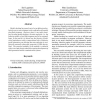Free Online Productivity Tools
i2Speak
i2Symbol
i2OCR
iTex2Img
iWeb2Print
iWeb2Shot
i2Type
iPdf2Split
iPdf2Merge
i2Bopomofo
i2Arabic
i2Style
i2Image
i2PDF
iLatex2Rtf
Sci2ools
108
click to vote
ICDCSW
2000
IEEE
2000
IEEE
Compositional Verification of a Third Generation Mobile Communication Protocol
Model-checking has turned out to be an efficient and relatively easy-to-use technique in the verification of formally described programs. However, there is one major drawback in using model-checking: the state explosion, i.e., the behavior models of real-life programs tend to be extremely large. In the article it is shown how the theories of behavioral equivalences with a compositional style of behavior model generation can alleviate the state explosion in verifying the externally observable properties of SDL descriptions. The practical usability of the method is evidenced with a case study that is taken from ongoing development of third generation mobile communication systems. Keywords Formal verification, model-checking, Compositional methods, SDL Communication protocols, UMTS
Related Content
| Added | 24 Aug 2010 |
| Updated | 24 Aug 2010 |
| Type | Conference |
| Year | 2000 |
| Where | ICDCSW |
| Authors | Sari Leppänen, Matti Luukkainen |
Comments (0)

